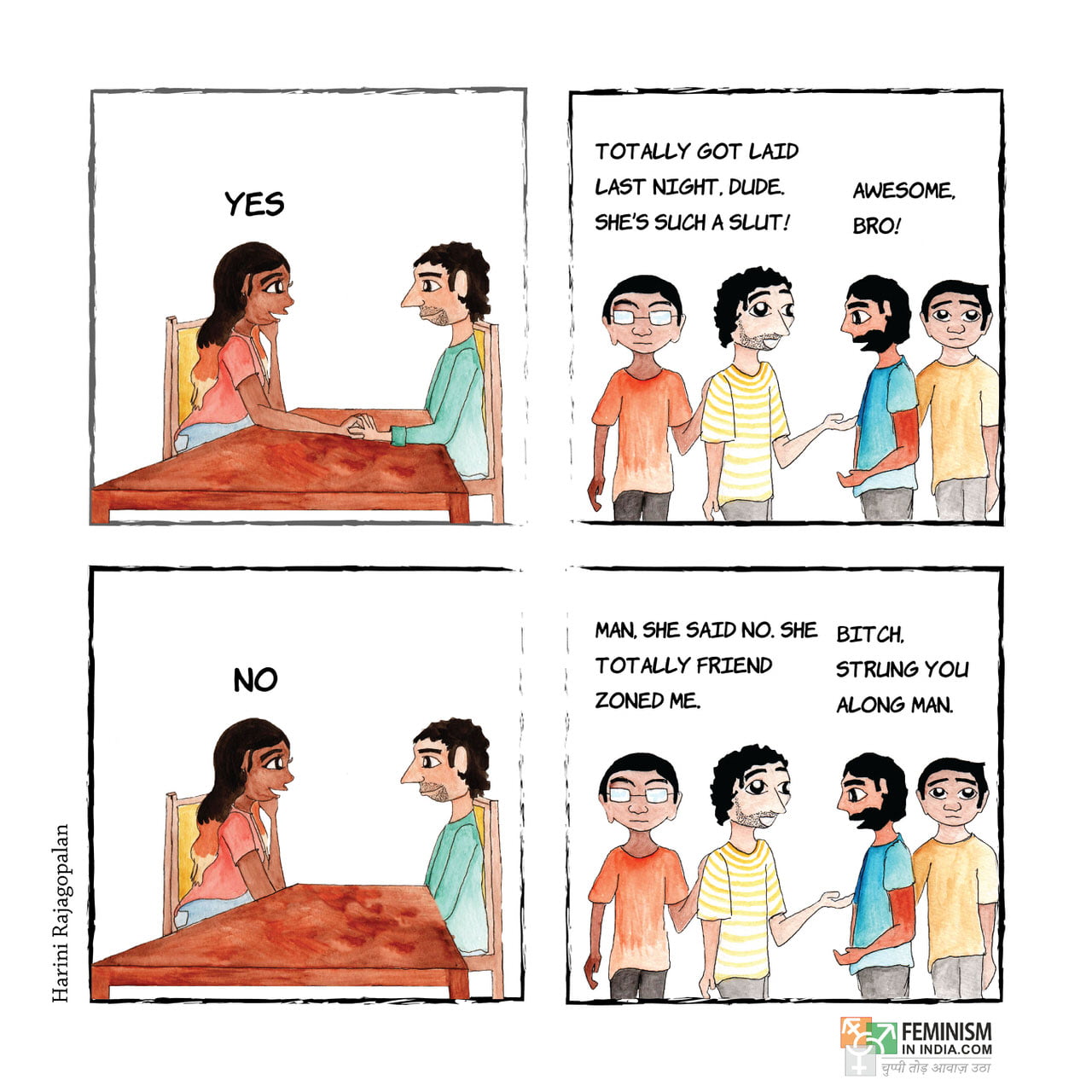“’Slut’ attacks a woman’s right to say yes. ‘Friend zone’ attacks a woman’s right to say no. And ‘bitch’ attacks her right to call you out on it.”– Anonymous
Side 1: Slut Shaming
Growing up, I was always the girl who didn’t care. Teenage boys (and some of them majors) hit on me as soon as puberty came, and after every break up I would date someone new after a while. I made friends with guys, I made friends with girls, I never cared about what I wore and whom I roamed with.
No one really knew about feminism at the time, and the ideology that went around wherever I went was that if you were seen with more than one guy, you were a “slut”. A slut meant a desperate girl, someone who was clingy and always wanting sex. This girl would usually be shamed for her looks as well – a desperate girl would be termed unattractive to add to the humiliation factor.
My first experience with slut shaming was by one of my own best friends who told me that since I was hanging out with “too many guys” it was obvious what I wanted and that people are bound to think I am a slut. She said she was warning me for my own good, for this behaviour of mine was unacceptable. That experience was not the last – I changed schools in grade XI, and was confronted by a girl I had met barely five minutes ago who asked me if I had “already” given a blowjob to the most popular guy in school.
My experiences are not isolated ones. Neha* says “Since I have a big chest, no blouse that I wear will ever prevent my cleavage from showing. But high-school was a place where one was labeled on their looks, and I was labeled the school slut because of my breast size. People, most of them guys, would reduce me to my appearance and would ask my body measurements. They would make up stories about me if they saw me with a guy, and assumed that I was sleeping around because of my ‘slutty’ outfits.”
Any behaviour which is “un-ladylike” or immodest is often considered offensive OR obscene, and for which women must be called out on.
Slut shaming only needs the smallest of excuses to manifest itself. “When I was about 14, I shifted to a new school, and being small in figure, my kurta was tight-fitting as well. A girl came up to me and told me to stop seeking attention and to stay in my limits! Sexualising me at the age of 14 was so shocking, all I did was wear clothes that were comfortable to me.” says Eshita*, New Delhi, recalling a childhood experience.
Slut. Whore. Wannabe. Prostitute. Cheap. Bitch. Randi. All of these words have been used to shame women for anything and everything that they do – be it wearing an ‘exposing’ outfit or be it hearing about someone’s sexual experiences, or even seeing them roaming around with a member of the opposite sex.
Slut-shaming is not an exclusive stigmatisation that women coming from urban backgrounds face. I still remember my house-help coming to work one day covered head to toe, a dupatta on her head, simply because the last time she didn’t cover her face when leaving for work she was beaten up by her father for immoral behaviour.
All of these experiences have some factors in common: that women’s bodies, from their faces to their legs, have been reduced to sexual objects, and that often the derogatory treatment that these women have received have been unsolicited and have resulted in obnoxious policing as well.
So why do people slut-shame? “I think it’s a lot about groups. In-groups and out-groups. The very term ‘slut’, is an ‘otherising’ word. In the larger context of India, one might argue that slut-shaming occurs as a reaction to a response towards a perceived violation of cultural propriety.” says Sudeep Pagedar, whose recent spoken word poetry “The Privileges Of A Penis” states that he slut-shamed women as a younger man, when he didn’t know any better and simply wanted to be “one of the men”. bell hooks in her famous Understanding Patriarchy explores how patriarchal structures teach men to ‘put women in their place’. Masculinity becomes suffocating and toxic when men are conditioned to believe they are entitled, as a superior gender, to assert their dominance over others, especially women.
Fearing being left out or being unaccepted, men and young boys to do what their friends are doing, and join in the bandwagon of slut-shaming. It seems harmless at first, but results in violent behaviour towards female peers. Amongst young children it can lead to bullying as well, as was Eshita’s case when she was ostracised simply for being different.
Another reason for slut-shaming could be simply that any behaviour which is “un-ladylike” or immodest is often considered offensive and obscene, and for which women must be called out on. This is how the pressure of conforming to conventionally accepted standards of femininity comes about.
“If a man does it, he’s a stud but if a woman does it, she’s a slut.”
Arnav Sharma, Gurgaon, says “I did indulge in slut-shaming when I was younger, I’m not proud of it. The reasons that we did it were mainly because we used to think that girls doing anything more than what they ‘should’ do were ill-mannered and indecent. We were also prudish about seeing women’s bodies, and so we commented on it without questioning why.”
And why do women slut-shame, then? A paper by Roy Baumeister and Jean Twenge exploring why, tells us that internalised misogyny makes us want to tear our female peers down, for other women are perceived as competition. The same internalisation also causes us to shame other women because of the taboo around women’s bodies, which are sexualized time and again.
The larger problem it all ties down to is that there are unequal standards for men and women across the world. Everyone has come across the age old “If a man does it, he’s a stud but if a woman does it, she’s a slut.” and sadly it is still quite true. It is also a suppression of women’s sexualities, any expression even mildly indicative of the same warrants shaming and derogation. Slut-shaming can also blow up into worse instances: crimes against women have the same roots of female suppression.
Harassment in the form of catcalling and eve-teasing are forms of slut-shaming. They only reinforce objectification of women, because the perpetrators know that their targets aren’t going to positively respond to their threats. That knowledge is an exercise of the dominative power that men hold over women’s sexuality.
In the same way, it is also this kind of continuing mentality that makes us victim blame and ask questions like “What was she wearing?” and say things like “She was dressed like she wanted it” when women complain of rape and molestation. Slut-shaming is sexual violence in its most basic and elementary form. We often don’t realise that we are policing someone’s body and sexuality – to change this, we need to actively stop stigmatising women who exercise their free choice.
Side 2: The Friend Zone
What is the friend zone? It’s when you tell someone that you like them but they say they’d rather be friends. Except that now the friend zone has been reduced to a blame-game of objectification where women are constantly targeted for not accepting a man’s good behaviour and being with him in ‘return’. It is an expectation of sexual gratification as a reward for being “nice”. However, if this sexual/romantic gratification is denied, then the same person turns hostile and resentful to the other for not appreciating their behaviour.
The term is now used in popular language for men “striking out” with women, and it demonises platonic relationships as sad leftovers of interactions with women who couldn’t be “scored” for sexual or romantic relationships. The friend zone implies that men are merely using being “nice” as a facade to gain sexual gratification from women. This disrespects and reduces men’s qualities of being kind and respectful as mere tools to be used to get ahead with women.
“I said no to a hosteller once in school, so he wrote FUCK ANYSHA on the football ground,” says Anysha Choudhary recounting her experience of misogyny surrounding “friend zoning”. Isha Kala, who goes to Hindu College, Delhi University says “In my college, they use the term ‘kaatna‘ for friend zoning. People would make statements like, “Arey, Isha toh iska bhi kaat rai hai” (Isha has friend zoned this guy also) whenever they would see me hanging out with anyone of the opposite sex. If a girl was friendly with a guy, people would assume she was interested in him but if the girl made it clear that she wasn’t, they’d call her out as someone who regularly friend zoned guys and say, “Yeh toh kaat deti hai“ (This one is a friend zoner)”.
The friend zone demonises platonic relationships as sad leftovers of interactions with women who couldn’t be “scored” for sexual or romantic relationships.
These experiences highlight how popular discourse now penalises women for “using” men and targets them as misandrists because they reject romantic advances. When a woman shows disinterest in a man, she is said to have “friend zoned” him. The friend zone perpetuates the idea that someone deserves respect only if they give you a relationship in exchange, and that is problematic because it ignores that people inherently deserve to be respected, regardless of romantic inclinations.
Often, the concept of “unrequited love” could be confused with the friend zone – except that unrequited love being one-sided does not blame the other person for their feelings, while the friend zone holds the other person accountable for ‘leading them on’. Narratives around the friend zone are also laced with the “nice guys finish last” notion, and that women don’t appreciate men being nice and put them all in a category of men to not consider being with.
Taylor Callobre’s The “Good Guy” Myth delves into the same questions and answers. She talks about how her company and body are not a reward for the good behaviour shown to her, and how her friendship cannot be reduced to a consolation prize because a different kind of relationship couldn’t be. The idea is simple: I deserve to be treated well by virtue of being a human and being nice to me does not entitle you to my body.
The concept of friend zone also fails to consider consent and choice, and reduces relationships to a simple formula: the nicer you are, the more sex you must get. But the reality of relationships is that it is (well, hopefully) a two way street, where both partners must be able to want the same things in order to carry on with it. When we go around saying a woman is friend zoning guys, we mischaracterise the rejectee as a “victim”, when the real issue is that a woman’s choice over whom to be with is not respected. Her agency over her body is under attack when all that she is doing is simply expressing her wishes.
Sudeep Padegar analyses the friend zone as a defence-mechanism or a pacification of the offended sense of entitlement. “It’s a BAD thing to be ‘only friends’ with a girl you like. It’s not about choice or preference. It’s about self-defence, protecting said ego. Friendship demands empathy and equitably supporting one another. When it is turned into a ‘zone’, these qualities seem non-desirable and threatening. It’s a phantom, but one that is made real by the collective conviction of millions.” he says.
Treating someone well cannot be a ticket for someone to get a sexual benefit out of another. This is the same mentality of male entitlement that a woman owes a man something because he is being nice to her.
Two Sides – Same Coin
The friend zone is as much about sexual objectification as slut-shaming is. Both concepts view women as sexual objects that need to be bragged about as conquests if “won”, or shamed as sluts, prudes, or friend zoners, if denied. We need to work towards changing the stigma around rejection as a bad thing, and instead inculcate the idea that rejection cannot warrant bad behaviour from the person facing it.
When women turn men down, the backlash received is extremely disproportionate and vicious.
When the idea of winning someone over becomes glorified, the outcomes of rejection can be horrific, and often escalates into violence and misogyny. This resentment on being rejected led to a 32-year old man throwing acid at Lakshmi when she turned down his marriage proposals. Many other women have been victims of acid attacks for the same reasons. When women turn men down, the backlash received is extremely disproportionate and vicious.
The idea of women owing men a relationship for being nice to them is one of the primary reasons for gender-based violence against women. Women have been murdered and/or assaulted because the perpetrator couldn’t deal with the rejection he faced. Whether you take the case of Kulwinder Kaur who was shot because she refused to dance with her murderer, or whether you take the case of Caroline Nosal, whose murderer stated that he “wanted more” from her, it all points to the same factors – that societal notions around relationships teach men that facing rejection is absolutely unacceptable and humiliating, that they are entitled to get what they want, and anything against their wishes is a serious blow to their masculinity, rather than being a matter of chance to be moved on from. When patriarchal notions teach men that they must assert their masculinity and power over women, agency is taken away from women, and the male ego is revered unnecessarily.
Slut-shaming is a disturbing concept, much like the friend zone, because both of them reduce women to objects meant for sexual enjoyment on someone else’s terms.
Slut-shaming is a disturbing concept, much like the friend zone because in the end both of them reduce women to objects meant for sexual enjoyment on someone else’s terms. The normalisation of both the ideas is dangerous – it only furthers stigma around women’s bodies and removes consent and choice from our vocabularies. If we instead focused on adapting to the fact that people inherently deserve respectful treatment and that female sexuality is quite normal, it would positively bring about change in our crime rates and make more places and interactions safer and better for women all around. Slut shaming and the friend zone need to be actively discouraged from our behaviours, only then will we start perceiving women as humans with agency and the right to exercise free will. I’m tired of exchanging the objectification coin as our social currency, aren’t you?
*Names have been changed.
About the author(s)
Tanya is a law student who hopes to make the world a better place for people of all genders, sexes, and sexualities. She also has an undying love for theatre, music, and biryani.





It’s a very good article with deeper insight into the social milue and with a good suggestion for making a beginning to overcome the patriarchical off shoots